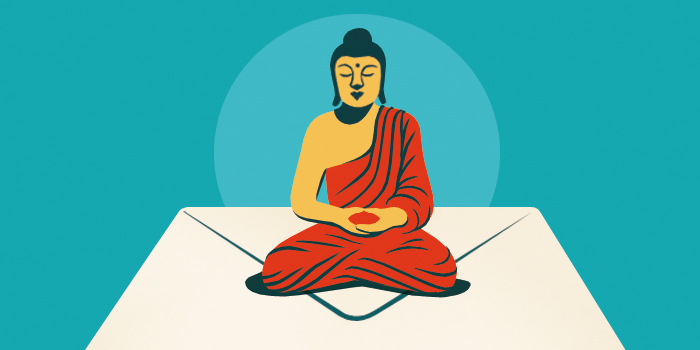Did the Buddha teach us to get rid of our emotions?
We may think—or even hope—that Buddhist practice will help us switch off unpleasant emotions so that we don’t have to experience them. Sorry, but emotions are part of being human! However, they don’t have to cause so much suffering.
Nearly always, pleasant and unpleasant emotions are a reaction to something. Vipassana meditation teacher Sharon Salzberg says that emotion is how our awareness relates to an object, tangible or intangible. Sometimes we want to cling to emotions and indulge them; at other times we want to suppress them and pretend they aren’t there. Both indulging and suppressing emotions are forms of craving that actually feed the emotion. The Buddha taught that people who have not awakened go through life being pulled this way and that by desire and aversion, and our emotions are the strings.
But even though we cannot switch off our emotions, we can work to loosen their grip and be free of their control. Through practice, we can reduce our reactivity and learn to accept our emotions. Buddhism teaches that one of the most basic ways to do this is through the practice of mindfulness. When an emotion arises, acknowledge it without judgment. You might even attach a label to it―Fear. Anger. Regret. Desire. Gradually you will start to notice how your emotions are tied to habitual reactions. Accepting emotions, rather than indulging or suppressing them, allows them to arise and pass away. With practice, we can break away from our old patterns and respond to circumstances more freely.
Sometimes emotions are described as impediments to enlightenment. But other teachings, particularly those from the Mahayana tradition, point out that working with them mindfully can be a skillful means (upaya, methods to attain awakening) to enlightenment, so we may need to pay attention to what they are telling us. For example, a Buddhist teacher might advise not to try to suppress a flush of anger because of the thought “It’s bad to be angry,” and not to cling to it or justify it, either. Instead, try asking where that anger is coming from. If you are angry because someone has jostled your ego, then the problem is ego, not the anger or the person who is the object of the anger. That’s an important lesson to learn.
A difficult emotion, such as deep grief, can stay with you for a long time, and our first reaction is often to try to distract or numb ourselves. Yet if we have the courage to accept a difficult emotion—or to ask others for help—healing can begin.

Tricycle is more than a magazine
Gain access to the best in sprititual film, our growing collection of e-books, and monthly talks, plus our 25-year archive
Subscribe now